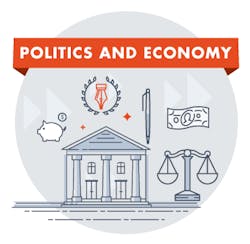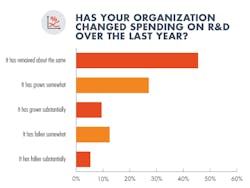Download this article in PDF format.
More than 60% of respondents to Electronic Design’s latest annual Salary Survey have positive feelings about the status of the United States economy, while around 15% feel negatively about it. Another 25% of the more than 1,300 survey respondents say they have no strong opinions about it either way. Only 3% harbor very negative feelings about the overall economy.
Electrical engineering represents one of the economy’s main engines. Semiconductor firms that supply parts for all sorts of products are monitored for clues about the future of the American economy. The Trump administration has had electronic devices in its crosshairs as it attempts to close a trade imbalance with China. Some tariffs imposed on Chinese products targeted capacitors and other parts.
Many survey respondents may be able to look through rose-colored glasses. Around two-thirds say employers pay them what they deserve. Approximately 40% maintain employers are planning to hire more engineering staff over the next year. One-tenth say staffing will decrease. More than 5% indicate employers have increased hiring following the Trump administration’s overhaul of the corporate tax code.
Nearly two-thirds of survey respondents are also winning pay raises. The average engineering salary has jumped from $105,040 to $113,624 over the last year, they report. One-fourth share in corporate profits, an increase of almost 5% over the last half decade. More than one-third of electronics and electrical engineers feel they should be better compensated considering the talent required for most electrical engineering jobs.
The number of available engineering jobs is on the rise. In the United States, approximately 318,300 workers are employed in electrical and electronics engineering, excluding around 66,000 computer hardware engineers, according to the Bureau of Labor Statistics. An estimated 28,700 jobs will be added over the next decade. Nearly 90% of respondents to Electronic Design’s survey say they enjoy their jobs.
Many companies are also expanding bonuses and other forms of compensation amid the tightening labor market in electronics and electrical engineering. Over the last year, around 37% say they have observed increased investment in research and development at their company. On the other hand, around 45% say that budgets have stayed the same, while 18% report spending decreases.
Many policies pursued by the Trump administration are controversial among survey respondents. More than half reveal that they have professional concerns about the Federal Communications Commission’s repeal of net neutrality rules. A similar percentage are professionally uneasy about the Trump administration’s trade policies and its decision to impose tariffs on Chinese products, including some electronic devices.
More than two-thirds of respondents say they support measures from the Trump administration to reform the H1-B visa system, which allows employers to temporarily employ foreign workers in occupations like engineering. (Around 45% of respondents work for companies that take advantage of the H1-B system for hiring.) Another 60% say they support an American investment push in artificial intelligence.
Many of those responding say they had not gained any direct benefits from the Trump administration’s move to curb corporate taxes. More than 70% admitted nothing had happened at their companies after the overhaul. Some respondents said that salary increases were given to senior executives, but only around one-tenth said engineering staff came away with either raises or other bonuses. And 5% said that their companies focused on share repurchases and dividends.







